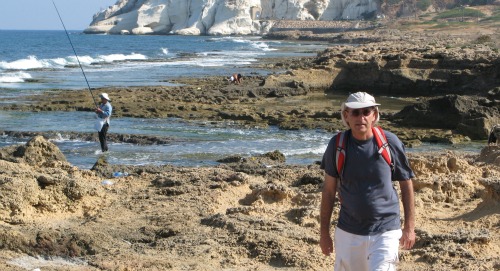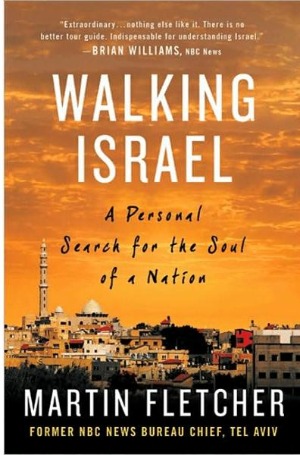Searching for Israel’s soul, Emmy-award winning NBC bureau chief Martin Fletcher chose to walk the country to cover daily living, rather than daily confrontations.

After 26 years of covering Israel’s conflicts, NBC Tel Aviv bureau chief Martin Fletcher wanted to tell a different story – not of daily clashes but of daily living. And so he set out, in 2008, on a two-week meet-and-greet hike along what he calls “the most interesting hundred miles of coast in the world” – from Rosh Hanikra in the north to the border with Gaza in the south.
The Emmy Award-winning journalist spoke with ISRAEL21c from New York as he wrapped up a 25-city North American speaking tour to promote his resulting book, Walking Israel: A Personal Search for the Soul of a Nation (St. Martin’s Press, September 2010).
“I really wanted to make my contribution toward showing the ‘real’ Israel that people don’t get to see,” says Fletcher, who retired in January and remains with NBC as a special correspondent.
“The only time you hear about the coast is when there’s a bomb or rockets. Yet 70 percent of Israel’s population, Arabs and Jews, live peacefully in the coastal plain and you rarely hear about them. So by walking along the coast, meeting the people, strolling through the towns, you get a completely fresh view of Israelis, a much more accurate one.”
Israelis are focused on peace and quiet
His conversations with Holocaust survivors, kibbutzniks, terror victims, Palestinian professionals and even a Zionist Arab revealed some new dimensions to the veteran journalist.
“Almost all the Israeli-Arabs I spoke to said ‘something will happen,’ meaning the Jews will be gone and we’ll get our country back. I was surprised at the depth of that attitude even among loyal citizens who’ve reached a high level in society,” Fletcher relates. “That is very relevant to understand when one talks about the peace process. Yes, let’s make peace, but understand it has to have totally unbreakable security guarantees. I knew that before but not nearly as much as now.”

Although most of the world thinks of Israel in terms of war and peace, observes Fletcher, “I think Israelis are more focused on peace and quiet and stability in their personal lives. And most of them have been successful in achieving that. This reality is lost on outsiders till they come and visit and are surprised at what a pleasant place it is.”
Fletcher, describing his Hebrew skills as “pathetic,” does not consider himself an insider. Despite a total of 30 years in Israel – he was in the country from 1973 to 1975 as a cameraman, and returned to take the Tel Aviv assignment in 1982 – “I don’t at all consider myself as Israeli. I never felt I particularly belonged anywhere.”
I can keep talking about this book forever
His parents fled Austria for London in 1939, but the destination was rather random. “I was born and grew up there but I never felt British. In Israel, I belong in the sense that I’m Jewish, but I never closely identified with the whole mission of Israel as a Jewish state. Israel must continue, and I hope to help, but I never felt I belonged.”
Still, Fletcher always felt comfortable in Israel. “I enjoyed life there from the start,” he says. “I was lucky to come with NBC News as a journalist for three years, and it became 28, which is a record for a TV correspondent. I came with my wife, who is Israeli, and the kids were all born there, so I immediately entered into Israeli family life. It was very easy.”
He and his sculptress wife, Hagar, expect to be traveling for the next few years, occasionally touching down in New York and London. Their three sons are grown and scattered: The eldest is doing improv theater in the United States; the second is studying architecture in New York and the youngest is surfing in Indonesia after a year in Mexico.
Fletcher has just completed another book, a novel about Jewish refugees in London during the last few months of 1945. Meanwhile, he is inundated with speaking requests regarding Walking Israel. “The Jewish Museum in New York will have an evening event about the book in January. Yale invited me to come in the spring. I can keep talking about this book forever. I am very much interested in talking about its message: That Israel is not just a country of war. It is a much nicer place than the country people hear about.”













